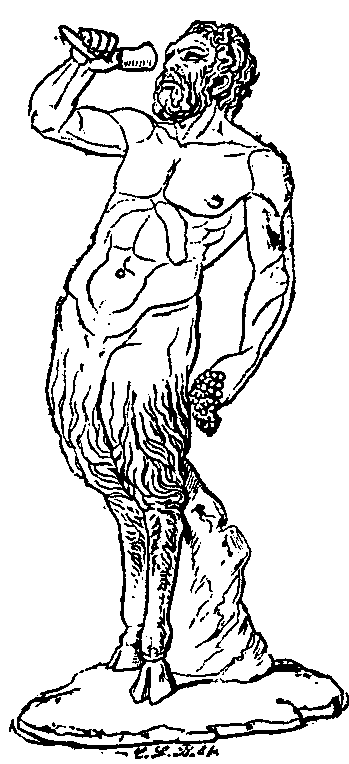|
Dictionary: Search the Dictionary Browse the Dictionary |
|
Timeline: Launch Interactive Timeline |
| Return to Front Page |
| PAN | |
| Form: lit. "the pasturer" | |
| [from the same root as the Lat. pastor and panis]. Originally an Arcadian god of hills and woods, the protecting deity of flocks, herdsmen, and hunters; the son either of Hermes and a daughter of Dryops, or of Zeus and the Arcadian Nymph Callisto. The ancients represented him with a puck-nose and bearded, with shaggy hair, two horns, and goat's feet. They imagined him as wandering by day through hill and dale with the Nymphs, guarding the flocks, especially the goats, and chasing wild animals [Homeric Hymn, xix]. In the heat of noonday he sleeps, and is then very sensitive to any disturbance; therefore at this time no shepherd blows his pipe [Theocr. i 16]. In the evening, sitting in front of his grotto,he plays on the syrinx, or Pan's pipe, which he himself invented. He is even said to have formed it from the reed into which a Nymph named Syrinx was changed while fleeing from his love [Ovid,Met. i 705]. There are many other tales of his love adventures with the Nymphs. As he excites the sudden ("panic") terror which attacks the wanderer in forest solitudes, so he was also said to have caused the panic which put to flight the Persians at Marathon; and on this account a grotto in the Acropolis of Athens was dedicated to him, and he was honoured with an annual sacrifice and torch procession [Herod., vi 105]. As a spirit of the woodland, he is also a god of prophecy, and hence there were oracles of Pan Like the similar figures of Silenus and the Satyrs, he was brought into connexion with Dionysus, in whose train he proved himself useful on his Indian expedition by means of the terror he inspired. As one of the gods of nature, he was one of the companions of Cybele; and by reason of his amorousness, he is associated with Aphrodite. In later times, owing to a misinterpretation of his name (as though it stood for pan, "the universe"), he was made a symbol of the universe. His cult was chiefly confined to the country. He was either worshipped with the Nymphs in grottoes, or his image was set up under the trees, where his worshippers brought it simple offerings such as milk, honey, must, rams, or lambs. Mountains, caves, old oaks, and pine trees, and the tortoise, were sacred to him; his attributes are the syrinx, a shepherd's crook, a garland of pine leaves or a twig of the pine tree. The fancy of later times invented as his companions young Pans, or Panisci, a species of imps of the forest, who were fabled to torment mankind by all sorts of apparitions, nightmares, and evil dreams. The Romans identified Pan with the Italian Faunus (q.v.). | |
|
|
|
| Pictures and Media | |
| PAN.(Florence.) |

|
|
Copyright 2000-2020 Peter T. Struck. No portion of this site may be copied or reproduced, electronically or otherwise, without the expressed, written consent of the author. |